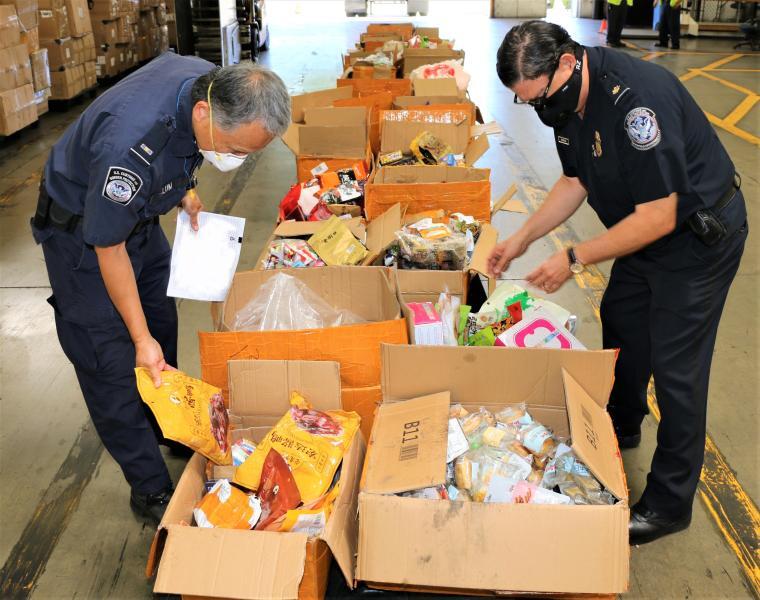
number of shipments containing prohibited pork,
chicken, beef and duck products. Photo credit Courtesy of U.S. Customs and Border Protection
LOS ANGELES (KNX) — The seizures of prohibited meat products from China are at “levels never seen before” at the Los Angeles/Long Beach seaport complex, according to U.S. Customs and Border Patrol agents.
Within the last three months of 2021, CBP agriculture specialists intercepted 262.237 pounds of prohibited pork, chicken, beef, and duck products, marking a 33% increase from the same period a year before, officials said.

Officials noted it’s a “concerning uptrend” that began intensifying in the midst of the pandemic, when the volume of prohibited animal products seized at the seaport reached an unprecedented 786,514 pounds, which was an 80% increase from the previous year.
“Preventing the introduction of foreign contagious animal diseases and noxious pests at our nation’s largest seaport is paramount and vital to our agriculture industry and the well-being of the communities we serve,” said Carlos C. Martel, CBP Director of Field Operations in Los Angeles. “We work closely with our USDA and private-sector partners to protect the nation from a variety of diverse agriculture threats.”
According to USDA, China is affected by African Swine Fever (ASF), Classical Swine Fever (CSF), virulent Newcastle Disease (vND), Foot and Mouth Disease (FMD), Highly Pathogenic Avian Influenza (HPAI), and Swine Vesicular Disease (SVD).
Agents found most of the unmanifested animal products commingled in boxes of e-commerce shipments and household goods in what officials said was an obvious attempt to smuggle the prohibited meats.
“CBP plays a major role in protecting American consumers and the agriculture industry from pests and diseases.” said Donald R. Kusser, CBP Port Director of the Los Angeles/Long Beach Seaport. “These unprecedented numbers reflect the critical role and outstanding contributions of CBP’s agriculture specialists, they have been working tirelessly identifying, intercepting and seizing these prohibited items.”
Officials said unregulated animal products from China are in high demand and smugglers attempt to sneak those products into the U.S. for profit without regard to consumer safety or potential damage to the agriculture industry.
Many consumers are not aware of the importation restrictions, officials added.
Pork products from countries affected by African Swine Fever may introduce the virus to the United States, which could cripple the domestic pork industry and U.S. pork exports valued at $6.5 billion annually, officials claim.
ASF is spread by contact with an infected animals’ body fluids, according to officials. It also can be spread by ticks that feed on infected animals.
You can read more about ASF from the USDA here: African Swine Fever – Frequently Asked Questions, USDA African Swine Fever – Fact Sheet.
Follow KNX News 97.1 FM
Twitter | Facebook | Instagram | TikTok

